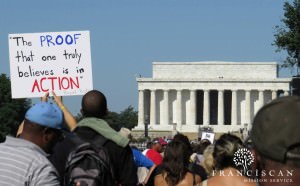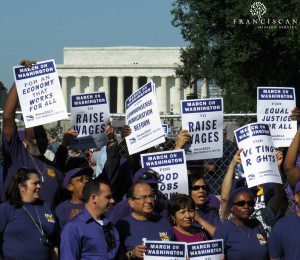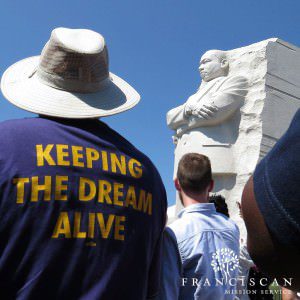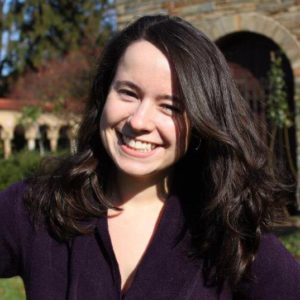We Shall Overcome: 50th Anniversary of the March on Washington
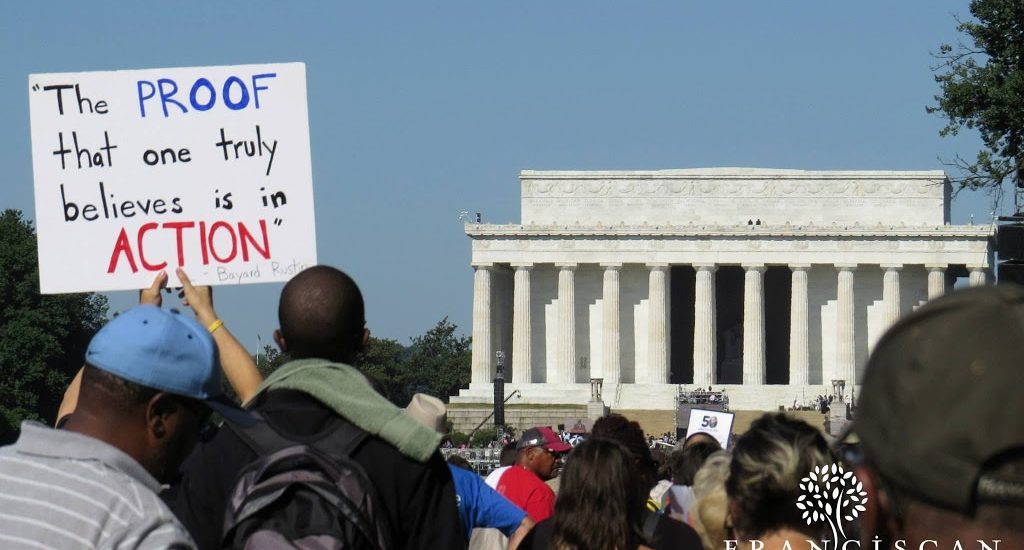
Washington, D.C. was abuzz this weekend with events commemorating Wednesday’s 50th Anniversary of the March on Washington. Communications Coordintor Bridget Higginbotham shares some thoughts on the experience she and Program Coordinator Natalie Helfrick had as attendees.
“Realize the Dream” March and Rally
Justice for Trayvon. Close Guantanamo. Stop racial profiling. Raise wages. Statehood for DC. Stop privatizing education. End racism. Protect voters’ rights. Keep the dream alive. Take action.
You name it, we saw it as we waded through the crowds Saturday at the Lincoln Memorial and Martin Luther King Memorial.
Taking in the sights and sounds with us was our new friend who had just moved here from Europe. As we tried to find a spot to hear the speeches, she asked a good question, “I understand the significance of commemorating the historical event, but what do all of these people hope to accomplish?”
At first glance, it did seem like a disjointed bunch of rallies and causes all convening in one place. I only heard bits of the speeches over the sound of the crowd, but I catch the phrase, “a more perfect union.” And I think that was the overall theme for the day, which could also be described as a continued drive for peace and justice.
How can we live in harmony if not all of our brothers and sisters are treated unfairly? How can we be unified if not everyone is given a valued place at the table?
A Catholic Conversation on Race, Religion and the March on Washington
“We’ve Come A Long Way,” sang the choir as we gathered Holy Redeemer Catholic Church for the special Mass celebrating peace and justice and a panel discussion,”A Catholic Conversation on Race, Religion and the March on Washington.”
While Saturday had me pondering the role of citizens and the government in addressing injustices, Sunday had me contemplating the role of Catholics and the Church. One audience commented that when you hear about the fight against abortion, you think “Catholic Church.” What if, she demanded, it were the same with the fight against racism?
From Fr. David Bava’s homily to the panelists’ points after Mass, the underlying point seemed to be, “We have come a long way, but we’re not done.”
Before the panel spoke, moderator Ralph McCloud, director of the Catholic Campaign for the Human Development at the USCCB, asked those who participated in the march in 1963 to stand up. As we clapped for them, I had goosebumps. Throughout the panel discussion, I tried to watch these original marchers for their reactions and they appeared to agree that 50 years ago they never imagined that we’d have a black president today.
We must celebrate how far we’ve come without neglecting the work that still needs to be done. As panelist Donna Toliver Grimes, Assistant Director of African American Affairs at the United States Conference of Catholic Bishops pointed out: people of all races have no problem riding the train or the bus together. However, we do not relate to each other on deeper levels. Grimes emphasized that we need to step across barriers culturally.
Fellow panelist Thomas Perez, U.S. Secretary of Labor, pointed out that there are many students entering premier public colleges and universities in the U.S. that have not had meaningful interactions of people of other races. How can this be and how can we fix it?
He said that one of his least favorite words is “tolerance,” implying that is should be used for describing a relating to brussels sprouts and not people. “I prefer tolerance over intolerance, but all the lingering injustices we find in the world prove that it is not enough. Until and unless we embrace our differences we will not achieve a post-racial America.”
Likewise, I think panelist John Carr, Director of the Initiative on Catholic Social Thought and Public Life at Georgetown University, had a profound definition of racism in his discussion on poverty and educational inequalities. “Racism is looking at those kids like they’re someone else’s kids. We need to look at all kids like they’re our own.”
These points made by Grimes, Perez and Carr really resonated with me because of how they intersect with the work of Franciscan Mission Service. Our goal to build bridges between cultures. Our belief is that everyone is our neighbor and should be loved as such. When our missioners return to their U.S. communities after serving abroad, they are able to share these experiences of bridge building and loving deeply as way to encourage others to do the same.
“Blessed are the peacemakers;” blessed are those who are working to bridge the divisions in our world and in our nation – from our missioners serving overseas to the panelists working here in D.C. Let us all be peacemaker, because it is not something that will happen if we sit back and wait for it. We must work together, now.
Sunday’s event closed with Monsignor Ray East of St. Theresa of Avila Catholic Church inviting everyone to link arms and join in singing, “We Shall Overcome.” As we swayed back and forth, I prayed that by God’s grace we truly will.
Tagged in:

